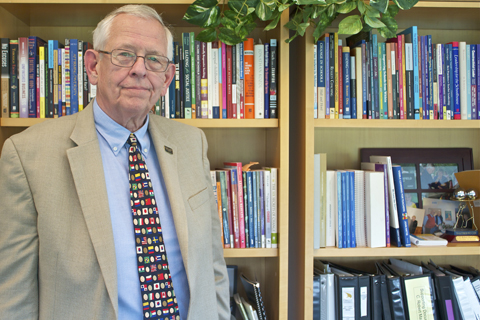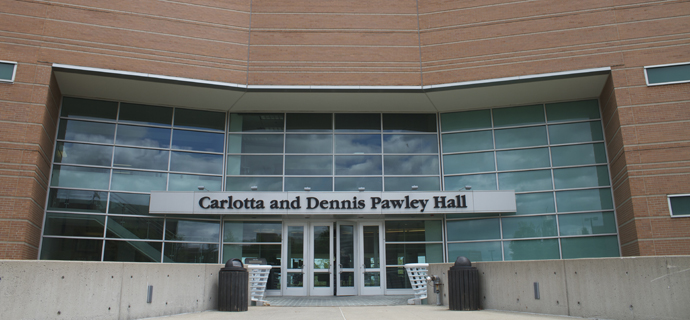by Kelli M. Titus
 |
| Rows of books on teacher preparation, leadership and diversity lie neatly on a bookshelf behind Dean Maxfield in his Pawley Hall office. |
“If I was 10 years younger, they’d have to drag me out of here,” said Bob Maxfield as he gazed out over Oakland University’s lush grounds from his fourth floor office in Pawley Hall.
Since fall 2013, Maxfield has held the position as interim dean of the
School of Education and Human Services (SEHS). Spending the bulk of his professional life as a school principal and superintendent, he began teaching educational leadership at OU in 2005. Maxfield was selected as interim dean when the previous dean assumed a position out of state.
Once he finishes his second year as interim dean, Maxfield will leave SEHS in the hands of someone who will support, guide and reshape the department’s agenda as he has. His efforts in promoting the school’s growth in teaching, research and service have benefited the entire OU community, from building a network of school partnerships and encouraging student research to exploring ways to enhance the lives of individuals with autism.
“This job provided me the opportunity to build on things SEHS was doing well and to launch some new initiatives,” Maxfield said. “It’s been a delightful year.”
Advancements in teacher preparation
Facilitating knowledge and a lifelong love of learning through exemplary programs such as the newly state-approved
M.Ed in Teacher Leadership, the SEHS’s Department of Teacher Development and Educational Studies approaches teacher training in unique and innovative ways. This program strives to develop a new generation of teachers, skilled and committed to transforming schools into leading learning communities.
“If you’re going to be a candidate for a teacher in the state of Michigan and you come to Oakland, you’re going to spend real time in real classrooms long before you student teach,” Maxfield said.
Giving college students a rare opportunity to utilize their studies in a K-5 environment,
OU launched the Avondale-Oakland partnership last fall. Juniors and seniors attend instruction methodology classes taught at Auburn and Graham Elementary Schools by Oakland professors and apply their newly acquired knowledge in the elementary classrooms. University and school leaders share a mutual vision for teacher preparation, implementing a dynamic learning experience for both OU and Auburn Elementary students.
The partnership’s “wrap around” services reach a variety of disciplines within the OU community, including the “Docs and Jocks” project aided by Oakland University William Beaumont School of Medicine to promote physical fitness and nutrition for elementary school children.
“Whether it’s a collaborative project with SEHS, the medical school, College of Arts and Sciences, or student organizations like the Student Michigan Education Association
(SMEA), the Avondale-Oakland partnership community has found numerous ways to share learning resources and engage with one another in authentic, meaningful ways,” said Marcia Hudson, Avondale-Oakland teacher leader. “Regardless of the individuals coming together, and the particular areas of expertise each represents, we find ourselves standing on common ground.”
The future of OU’s teacher development will not end at Avondale, as the elementary school has become a platform for producing a greater network of school partnerships.
“If we learn something about university partnerships that help public schools,” Maxfield said, “then why aren’t we doing it in other places?”
The University is in the process of partnering with neighboring school districts, beginning with Pontiac. OU lies only six miles away from this school system, which is losing vital programs that effectively teach and motivate students. SEHS faculty and students will use what they have learned in developing the Avondale-Oakland partnership to successfully work with Pontiac students and staff. This partnership is expected to commence with the new school year.
“I’d love to think that by a year from now the Pontiac-Oakland partnership would be up and running, the partnership with Utica schools would be developing and we’d have figured out what’s the best way to work in Birmingham, Bloomfield and West Bloomfield,” Maxfield said.
To discover the most effective way to develop these new partnerships, the SEHS team will investigate and document research-based methods, allowing teachers to construct, mold and revise best teaching practices.
Emerging opportunities for research
Continuing to explore research opportunities in each of its departments, SEHS is discovering ways to enhance leadership for a variety of disciplines. Examples can be found in the newly merged
Department of Organizational Leadership and the
Oakland University Center for Autism.
“We have this nice menu of leadership,” Maxfield said. “If you’re interested in teacher leadership, empowerment and collaboration, go to Galileo. If you’re interested in helping your organization become more effective and efficient, go to Lean.”
Learning the effectiveness of teacher leadership, students studying with the
Galileo Institute for Teacher Leadership focus on creating schools where guidance is shared, promoting partnerships and providing a different view of leadership. This is initiated through the institute’s efforts to encourage the use of high-tech tools to expand teachers’ access to best practices, data, resources and communication with other teachers, sponsor and facilitate leadership conferences and seminars, and partner with on-going local efforts to provide professional coaching and mentoring.
In contrast to nurturing the growth of teachers in leadership roles, the
Pawley Lean Institute cultivates the minds of those interested in management and human resources, providing instruction, research and development of interdisciplinary principles. The institute shares concepts and practices of Lean methods to create leaders and learners in the community by incorporating tools, techniques and management philosophies.
Furthering their effort in research development, SEHS houses OUCARES, an Oakland University program that supports Autism Spectrum Disorder (ASD). OUCARES works with students and faculty to integrate autism research and knowledge into academic course work, preparing students to become leaders in the autism community. To better understand and improve the quality of life for individuals with ASD, SEHS advances research through OUCARES by studying and engaging those impacted.
Providing service to the autistic community
"Bob Maxfield's support for OUCARES has been wonderful,” said OUCARES Director Kathy Sweeney. “Because of his passion and common sense approach, OUCARES has made incredible strides this past year.”
Keeping with their commitment in providing autism awareness, Maxfield and OUCARES have expanded the autism center’s research, community engagement and programs, including Practical Film Workshops and the Micro Business Center.
“Oakland University is truly home to a comprehensive center for autism,” Maxfield said. “OUCARES has always been strong and we have a strong reputation for teaching teachers who are going to work with kids on the autism spectrum.”
Funded by a $500,000 grant from the State of Michigan Department of Community Mental Health, OUCARES offers a Practical Film Workshop for Adults with ASD. This 15-week program partnering with Inclusion Films, including creative director, actor and writer Joey Travolta on empowering adults with ASD to develop the skills necessary for employment in the film and media entertainment industry.
In the past year, the program dramatically expanded when OU discovered a partially unused school in Oakland County, leased the space and converted it to house the film workshops.
Young adults with ASD can also find help in gaining employment through OU’s Micro Business Center. With the hopes of launching this summer, the project will join forces with the Judson Center and Autism Alliance, with space allocated by OU Incubator, to employ young adults on the autism spectrum. Those employed will be paid, trained and offered a job coach.
The center will also integrate graduate and undergraduate students from the School of Business to serve as mentors. With a community-wide effort, Maxfield is hopeful the Micro Business Center will be a great success in “employing previously unemployable people” and enhancing the quality of life for those with ASD.
Potential to grow
With a well-written agenda aimed at cultivating SEHS’s teaching, research and service initiatives, Maxfield will embrace another year, preparing for the individual who will eventually fill his seat as dean.
“What I discovered when I got here was not just that it was a good job, but that lots of good things were happening,” Maxfield said. “We have a supportive administration, a strong faculty and exceptional programs to build upon.”



